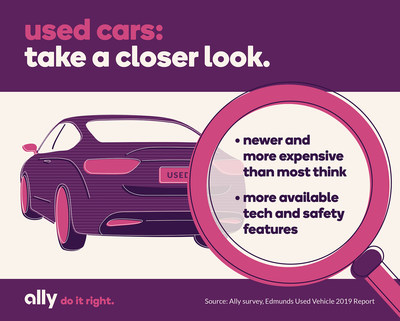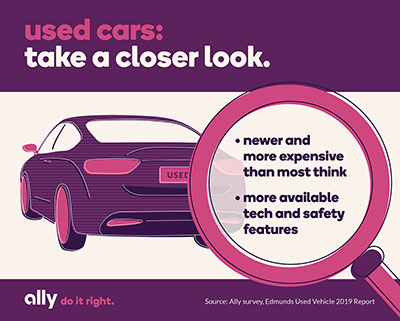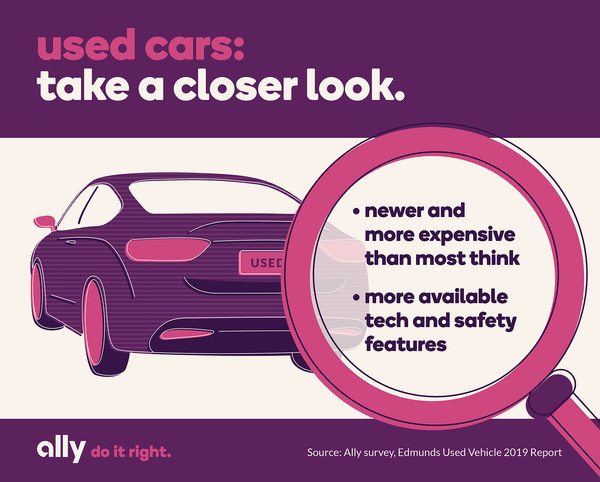DETROIT, Nov. 4, 2019 -- Used vehicles are increasingly popular with Americans as consumers turn to the used market for more affordable options, but a recent Ally survey finds many Americans still hold outdated notions about used cars.

U.S. consumers think used cars are older and less expensive than they really are, according to an Ally Financial survey of more than 2,000 American adults conducted by The Harris Poll.
On average, Americans think the average age of a used vehicle at the point of sale is 6.6 years, but data from a 2019 Edmunds Used Vehicle Report puts the average age at 4 years. Additionally, consumers in the Ally survey believed that the price of a used vehicle, on average, at the time of sale is $9,860 when it is more than twice that amount, $20,664, according to Edmunds.
Approximately one-third of Americans (31%) in Ally's survey thought the average used vehicle was more than twice as old, 8 years or older, as the actual average age, and only one in 10 Americans correctly said the average purchase price of a used car is more than $20,000.
"Today's used vehicles feature better quality and options than ever before. A 75,000-mile used vehicle is in an entirely different category than it was just a few years ago," said Matt Arnold, Senior Regional Vice President of Auto Finance at Ally Financial. "Today's used models have many of the same tech and safety features that new cars offer, but at a significantly lower price point. They're a smart alternative for all budgets and lifestyles, particularly when you consider the average new car price is approaching $38,000."
According to the Ally survey, consumer opinions on the average price of used vehicles depended on a range of factors:
- Homeowners said used vehicles cost almost $3,000 more than renters did ($10,604 vs. $7,876).
- The higher the household income, the more expensive they estimated used vehicles were. On average, Americans with household income of:
- Under $50,000 said used vehicles cost $7,684
- $50,000-$74,999 said used vehicles cost $9,225
- $75,000-$99,999 said used vehicles cost $10,735
- $100,000+ said used vehicles cost $11,938
- On average, Millennials/Gen Z (ages 18-34) estimated the lowest average vehicle cost of any age group, while Americans ages 45-54 estimated the highest average vehicle cost, mirroring the progression of income across a career. On average, those ages:
- 18-34 said used vehicles cost $8,513
- 35-44 said used vehicles cost $9,567
- 45-54 said used vehicles cost $10,907
- 55-64 said used vehicles cost $10,806
- 65+ said used vehicles cost $10,385
"Even though many Americans are buying used cars, the survey shows too many people lump all used cars with old clunkers," Arnold said. "It's time to let go of old stereotypes. Adding used vehicles to your consideration list can be a smart move. You'll either end up with a lot more car for your money, or a lot more money in your wallet."
Arnold advises used car shoppers to consider the following:
- Prioritize your needs and wants – Think practically about which features are necessary to get you to your destination safely. Some nice-to-have tech features add to the price and can cost thousands of dollars in repairs if they break.
- Get a vehicle history report – The minimal cost is worth the investment, and some car dealers will provide it for free upon request.
- Know your budget – Your automotive budget should not only include the purchase price, but also insurance, finance costs, and ongoing maintenance and repairs.
- Research finance options – With some planning and research, a car purchase doesn't have to strain your budget. A healthy down payment—at least 10% of purchase price is recommended for a used car—can reduce your monthly costs.
- Go online – Auto dealers want buyers to walk away feeling good about their purchase and welcome well-researched shoppers. Prepare yourself by checking online resources like Kelly Blue Book or Edmunds for a specific vehicle's local market value.
- Consider a service contract – Protection plans help provide peace of mind and can cover expenses for repairs and replacement parts that may no longer be under a manufacturer's warranty.
To learn more about car buying and ownership, go to www.ally.com/do-it-right/car.
Methodology: The survey was conducted online by The Harris Poll on behalf of Ally Financial from May 7-9, 2019, among 2,012 U.S. adults ages 18 and older. This online survey is not based on a probability sample therefore no estimate of theoretical sampling error can be calculated. For complete survey methodology, including weighting variable and subgroup sample sizes, please contact Ally Financial public relations.
About Ally Financial Inc.
Ally Financial Inc. (NYSE: ALLY) is a leading digital financial-services company with $181.5 billion in assets as of September 30, 2019. As a customer-centric company with passionate customer service and innovative financial solutions, we are relentlessly focused on "Doing It Right" and being a trusted financial-services provider to our consumer, commercial, and corporate customers. We are one of the largest full-service automotive-finance operations in the country and offer a wide range of financial services and insurance products to automotive dealerships and consumers. Our award-winning online bank (Ally Bank, Member FDIC and Equal Housing Lender) offers mortgage-lending services and a variety of deposit and other banking products, including savings, money-market, and checking accounts, certificates of deposit (CDs), and individual retirement accounts (IRAs). Additionally, we offer securities-brokerage and investment-advisory services through Ally Invest. Our robust corporate finance business offers capital for equity sponsors and middle-market companies.
For more information and disclosures about Ally, visit https://www.ally.com/#disclosures.
CONTACT:
Ann Smith
313-656-5881
ann.smith@ally.com

